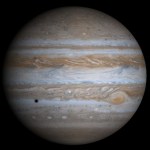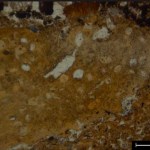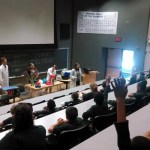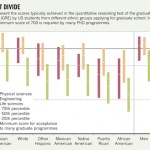Science
For some reason, the topic of really big rocks came up at dinner the other night, and SteelyKid declared that she wanted to find "A rock as big as the solar system." We pointed out that that was pretty much impossible, more or less by definition, rocks being sub-parts of the solar system.
"OK, how about a rock as big as Jupiter?" That's a much harder question to answer, and required a trip to the Internet. Not during dinner, of course-- it's hard enough to get her to eat when we're all sitting at the table-- but a day or so later, which led to this blog post.
So, there are a couple of…
After a bit of a hiatus because of scheduling issues, Rhett and I are back to talk about... stuff. Mostly summer classes, World Cup soccer, and Twitter. Also, how we've each gotten a blog comment from Neil deGrasse Tyson.
Miscellaneous links:
-- My long-ago book review and Rhett's more recent complaint about Cosmos, where we each had a brush with scientific celebrity.
-- My silly cat tweet that's generated a huge amount of traffic:
Busy day at Schroedinger Industries... RT @EmrgencyKittens: How to organize your cats. pic.twitter.com/z3QS0fnSdL
— Chad Orzel (@orzelc) June 24, 2014
-- Rhett's…
Stinky stuff! This fits perfectly with my biased preconceptions. So here are two examples of chemistry used to analyze things you'd normally run away from.
The oldest traces of human poop have been dug out of a cave in Spain — and it's Neandertal poop. It's about 50,000 years old, and it's been reduced to a compressed, thin smear of organic compounds, so I guess it isn't actually so stinky anymore, but there was enough of it to analyze chromatographically. In case you've wondered your whole life about what Neandertal poop would look like, here you go.
Microphotographs of a slightly burned…
If there's one thing that antivaccine activists share in common, it's the passionate (and as yet unproven) belief that "something" out there in the environment caused the "autism epidemic." Usually, that "something" thought to be vaccines, but with the utter failure of the vaccine-autism hypothesis to the point where it is considered soundly refuted, antivaccinationists have gotten a bit more—shall we say?—creative. Now it's something in the environment. Sometimes it's mercury, despite the utter lack of evidence that mercury in vaccines is even remotely linked to autism. Sometimes it's…
A few weeks back, a Union alumnus who works at Troy Prep contacted the college to arrange a visit for a bunch of second-graders, and asked if faculty would be willing to arrange talks and demos for the kids. I said something like "Sure, we could probably make liquid nitrogen ice cream for them," and then basically forgot about it until last week, when I said "Oh, crap, I have to make liquid nitrogen ice cream for 60 seven-year-olds on Monday!"
Fortunately, our students in the Department of Physics and Astronomy are awesome, and I was able to round up a handful of helpers from the summer…
If this looks a bit familiar to some of you, let's just say that it's grant crunch time again. This should be over after today. I hope.
In the meantime, one of the difficult things about science-based medicine is determining what is and isn't quackery. While it is quite obvious that modalities such as homeopathy, acupuncture, reflexology, craniosacral therapy, Hulda Clark's "zapper," the Gerson therapy and Gonzalez protocol for cancer, and reiki (not to mention every other "energy healing" therapy) are the rankest quackery, there are lots of treatments that are harder to classify. Much of the…
I’ll admit it: I’m a bit of a beer snob. I make no bones about it, I like my beer, but I also like it to be good beer, and, let’s face it, beer brewed by large industrial breweries seldom fits the bill. To me, most of the beer out being sold in the U.S., particularly beer made by Anheuser-Busch and MillerCoors can easily be likened to cold piss from horses with kidney disease (you need protein to get beer foam, you know), only without the taste. I have to be mighty desperate and thirsty before I will partake of such swill. I will admit that there is one exception, namely Blue Moon, which is…
Credentialism always makes for convenient excuses. We love to construct simple shortcuts in our cognitive models: someone has a Ph.D., they must be smart (I can tell you that one is wrong). Someone is a scientist, they must have all the right facts. And of course, the converse: we can use the absence of a Ph.D. or professional standing, to dismiss someone.
Creationists are very concerned about this, and you see it over and over again: the desperate need to acquire a degree or title, even if it is from some unaccredited diploma mill or a correspondence school, in order to justify their wacky…
As noted earlier, I was a guest on the Read Science! hangout on G+ earlier today. If you weren't able to watch it live, the video is available at that link, and I'll embed it here:
There were some feedback problems with the audio for a little while-- annoyingly, it only got bad once the hangout went live-- there was a tiny echo when we were talking about logistics beforehand, but not enough to justify screwing around with earbuds. then when we started the actual event, it suddenly got completely awful for a while. It does get better, though-- I have no idea why, but later on, the echo is…
Rhett and I haven't done Uncertain Dots for a couple of weeks due to scheduling issues, but that doesn't mean I'm neglecting the multimedia side of things. In fact, I'll be doing a hangout today, as a guest on the Read Science! hangout hosted by Joanne Manaster and Jeff Shaumeyer. The event page is here.
I've also got four summer research students to supervise this year, who quite reasonably expect a fair bit of my time (thus the blog silence this week), and thus I'll be doing this from my office on campus, which means Emmy isn't going to be joining in. Alas. Odds are good that I'll have to…
Day two of the New Frontiers wrap-up conference. This is a slow liveblog with more cosmology and life in the universe. Yesterday's summary is here
A couple of years ago, the Templeton Foundation funded the New Frontiers program to pose "Big Questions" in some areas of science.
This is a slow liveblog - part II will be tomorrow with more cosmology and life in the universe
Seed funding was provided to 20 investigators and small groups to start exploratory research, and, now, it is time to say what they found.
This follows up from the New Frontiers kick-off conference back in 2012.
We start the…
A couple of years ago, the Templeton Foundation funded the New Frontiers program to pose "Big Questions" in some areas of science.
This is a slow liveblog - part II will be tomorrow with more cosmology and life in the universe
Seed funding was provided to 20 investigators and small groups to start exploratory research, and, now, it is time to say what they found.
This follows up from the New Frontiers kick-off conference back in 2012.
The New Frontiers conference to report the hint of the beginning of the draft of the answers is under way... most of the investigators and about half of the…
The latest in a long series of articles making me glad I don't work in psychology was this piece about replication in the Guardian. This spins off some harsh criticism of replication studies and a call for an official policy requiring consultation with the original authors of a study that you're attempting to replicate. The reason given is that psychology is so complicated that there's no way to capture all the relevant details in a published methods section, so failed replications are likely to happen because some crucial detail was omitted in the follow-up study.
Predictably enough, this…
Deepak Chopra isn't very happy right now. In fact, he appears downright pissed off right now, particularly at skeptics, so much so that he's issued a hilariously fatuous "challenge" to James Randi (a.k.a.) The Amazing Randi on You Tube entitled Deepak Chopra's One Million Dollar Challenge to Skeptics:
Yes, apparently with The Amazing Meeting (a.k.a. TAM) less than four weeks away, Chopra is looking to stir the pot a little bit with his usual blend of Choprawoo about consciousness and mind-body dualism and how nasty skeptics can't accept the paranormal and the healing powre of "intent." It's…
A bunch of people were talking about this Nature Jobs article on the GRE this morning while I was proctoring the final for my intro E&M class, which provided a nice distraction. I posted a bunch of comments about it to Twitter, but as that's awfully ephemeral, I figured I might as well collect them here. Which, purely coincidentally, also provides a nice way to put off grading this big stack of exam papers...
Anyway, the thrust of the article is that the GRE is a bad thing to be using as an admissions criterion for graduate school in science and engineering, because it has large…
I had a couple of conversations at DAMOP last week about career issues, and I just want to note that I will never get used to the idea that I'm a respected elder anything, whose advice would be valued. I basically feel like I lucked into my whole career, so I hesitate to advise others as to what they should do. But then, there's a huge element of luck in any tenure-track career, given the tiny ratio of jobs to candidates.
One thing that came up was, of course, the question of how it is I run a blog, which connects to the larger question of work-life balance. One of the people I spoke to…
"There is no dark side of the moon really.
Matter of fact it's all dark."
While the Moon has a nearside and a farside, it does not, actually, have a dark side or a light side, now. At least not a fixed dark side, just a slowly moving night side, and day side.
But it used to. Sorta.
"I remember the first time I saw a globe of the moon as a boy, being struck by how different the farside looks," said Jason Wright, assistant professor of astrophysics. "It was all mountains and craters. Where were the maria? It turns out it's been a mystery since the fifties."
Jason, Arpita Roy a Penn State grad…
The Cosmos reboot season finale (or possibly series finale; not sure if they're trying for a second set of episodes) was last night, but I wasn't able to take part in the live-tweeting of it thanks to a super-restless Pip who didn't drop off until 9:30 EDT. I suppose I could've waited to start the DVR until I would synch up with the West Coast showing, but then, I also need sleep. and I greatly enjoyed being able to fast-forward through the innumerable commercials.
And, really, if you want the story of the Cosmos reboot in a nutshell, there's no better capsule summary than the treatment of…
I'm working on some short pop-quantum explainers for reasons that I'll be a little cagey about. In casting around for a novel way to introduce Schrödinger's cat states, I hit on something that probably works, but illustrates the problems inherent in being both a professional physicist and a pop-science writer.
The hook, as I mentioned on Twitter a little while back (early on a weekend morning, so nobody read it) is that you have Schrödinger's cat to thank for the computer you're reading this on. The core idea of the infamous cat paradox is that it's both alive and dead at the same time,…
I don't have anything all that new to say about last night's Cosmos reboot, and I'm leaving for scenic Madison, WI today to attend DAMOP, so I don't have a great deal of time. Kate did mention something over dinner last night, though, that's a good topic for a quick blog post.
Kate's a big listener of audiobooks and podcasts, including The Naked Scientists podcast, and she mentioned something they said in responding to a question about charging phones and the cost of electricity:
I think my favourite one is a microwave oven. So, the clock on a microwave oven uses more electricity over the…



